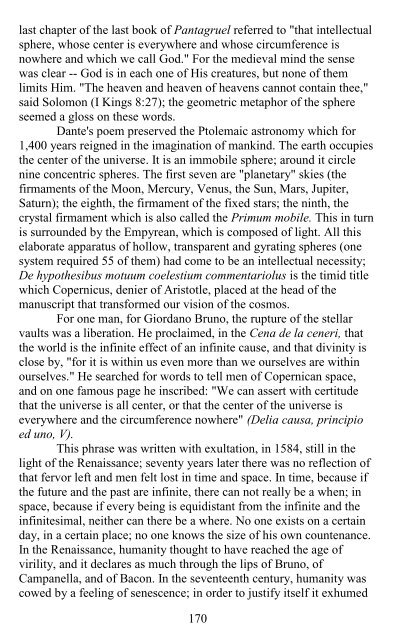Jorge Luis Borges - Labyrinths
Jorge Luis Borges - Labyrinths
Jorge Luis Borges - Labyrinths
Create successful ePaper yourself
Turn your PDF publications into a flip-book with our unique Google optimized e-Paper software.
last chapter of the last book of Pantagruel referred to "that intellectual<br />
sphere, whose center is everywhere and whose circumference is<br />
nowhere and which we call God." For the medieval mind the sense<br />
was clear -- God is in each one of His creatures, but none of them<br />
limits Him. "The heaven and heaven of heavens cannot contain thee,"<br />
said Solomon (I Kings 8:27); the geometric metaphor of the sphere<br />
seemed a gloss on these words.<br />
Dante's poem preserved the Ptolemaic astronomy which for<br />
1,400 years reigned in the imagination of mankind. The earth occupies<br />
the center of the universe. It is an immobile sphere; around it circle<br />
nine concentric spheres. The first seven are "planetary" skies (the<br />
firmaments of the Moon, Mercury, Venus, the Sun, Mars, Jupiter,<br />
Saturn); the eighth, the firmament of the fixed stars; the ninth, the<br />
crystal firmament which is also called the Primum mobile. This in turn<br />
is surrounded by the Empyrean, which is composed of light. All this<br />
elaborate apparatus of hollow, transparent and gyrating spheres (one<br />
system required 55 of them) had come to be an intellectual necessity;<br />
De hypothesibus motuum coelestium commentariolus is the timid title<br />
which Copernicus, denier of Aristotle, placed at the head of the<br />
manuscript that transformed our vision of the cosmos.<br />
For one man, for Giordano Bruno, the rupture of the stellar<br />
vaults was a liberation. He proclaimed, in the Cena de la ceneri, that<br />
the world is the infinite effect of an infinite cause, and that divinity is<br />
close by, "for it is within us even more than we ourselves are within<br />
ourselves." He searched for words to tell men of Copernican space,<br />
and on one famous page he inscribed: "We can assert with certitude<br />
that the universe is all center, or that the center of the universe is<br />
everywhere and the circumference nowhere" (Delia causa, principio<br />
ed uno, V).<br />
This phrase was written with exultation, in 1584, still in the<br />
light of the Renaissance; seventy years later there was no reflection of<br />
that fervor left and men felt lost in time and space. In time, because if<br />
the future and the past are infinite, there can not really be a when; in<br />
space, because if every being is equidistant from the infinite and the<br />
infinitesimal, neither can there be a where. No one exists on a certain<br />
day, in a certain place; no one knows the size of his own countenance.<br />
In the Renaissance, humanity thought to have reached the age of<br />
virility, and it declares as much through the lips of Bruno, of<br />
Campanella, and of Bacon. In the seventeenth century, humanity was<br />
cowed by a feeling of senescence; in order to justify itself it exhumed<br />
170


